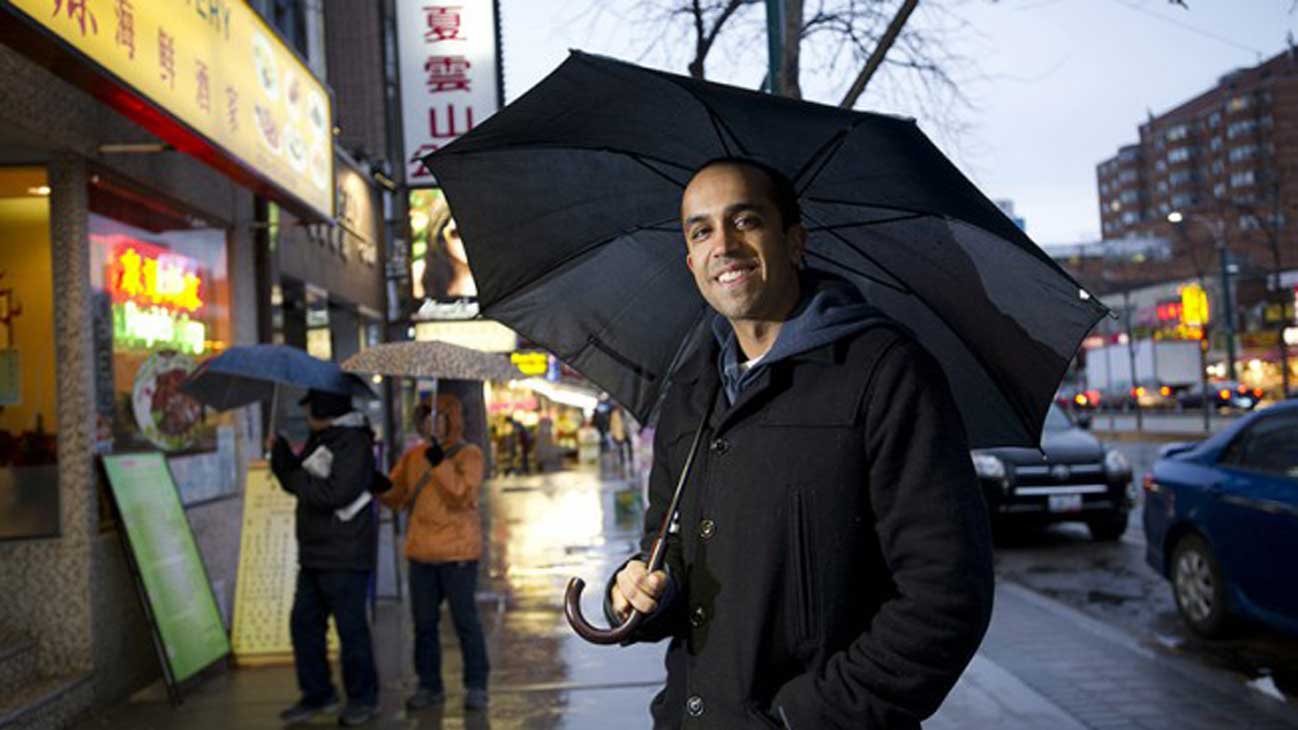A Harvard MBA, New York Times bestselling author, award-winning blogger, and one of the most popular TED speakers in the world, Neil Pasricha is “a pied piper of happiness”* who dazzles audiences with ideas and frameworks that skyrocket happiness into the stratosphere. With infectious enthusiasm, heartfelt authenticity, and a “what works” authority, Neil draws on the latest research in happiness to increase individual performance and create a more positive and productive workplace. In this recent column for The Toronto Star, Neil explains why “do” is such an important word:
I never learned to swim as a kid.
Ear infections dotted my childhood, so I was outfitted with never-ending sets of tubes. Swimming lessons became skating lessons when I got fancy rubber moulded earplugs and a plastic cap for showering.
I was afraid of swimming and became good at avoiding it. Why didn’t I swim? First, I didn’t think I could swim. Second, I didn’t want to swim. Strapping on a bathing suit meant showing off my spaghetti arms and man boobs. It meant getting cold and wet and chlorine-y and showering and changing afterward. Why? Exercise could be done in other ways. As I got older, I told myself the best conversations at the pool party were at the barbecue. And I didn’t live near an ocean. So I convinced myself swimming was a waste of time.
What are the two barriers we place in front of our least desirable tasks? Capability and motivation. In other words, can’t do it and don’t want to, anyway! It looks like this:
Can Do → Want To Do → Do.
Everything changed in a flash when I fell in love with Leslie over a few months. We’re married today, but it was only a few dates in when she started telling me one night how much she loved to swim. “It’s my favourite thing to do in the world,” she said. “The water just feels like home.”
“Not me,” I said, disappointed. “I don’t swim. Not a big fan.”
“Oh, that’s too bad,” she said. “You see, my family has had a cottage, for generations, on an island. Every morning the 20 of us — my 80-year-old grandparents, my 10-year-old cousins — jump in the lake and swim around the island.”
She gave an Obama-like pregnant pause and then said:
“I guess you can’t come.”
That night, for the first time in more 30 years, I signed up for swimming lessons.
Suddenly, without thinking whether I could do it or whether I wanted to do it, I just did it.
I signed up for an adult learn-to-swim program, offered by the city of Toronto, at the Trinity Bellwoods pool. A few weeks later, I was walking onto the pool deck with my heart thumping. I felt like running away. But I ended up learning one of the most valuable lessons of my life instead.
What happened?
Well, within two minutes, I realized I fit in. Who was with me? People with traumatic experiences. People from landlocked countries. I wasn’t the worst swimmer in the group, for once. We all sucked. Trust formed quickly. The instructor asked us to flutter-kick, with our life-jackets on, in the shallow end. That was it. The next week, we moved to the deep end. A month later, I was treading water. And by the end of eight weeks, I was doing the front crawl.
How did I learn to swim in only a few hours when I was terrified of it my whole life?
Well, here’s what happened. After my first swimming lesson, the idea that I might be able to swim crept into my head. I thought I could do this. And the thrill of flutter-kicking in the shallow end gave me motivation to go back next week and see what else I could do. I wanted to swim now. I love mouldy locker rooms. Give me the flutter board. I was desperate to get back.
My Do Line changed from this:
Can Do → Want To Do → Do
To this:
Do → Can Do → Want To Do
Instead of finishing at Do, I started there. And that made me think I could do it. And that made me want to do it. Everything happens backward. You start doing and confidence and motivation follow.
The Do Circle completely reverses how most of us operate every day. We think we need ability and motivation before action. Otherwise, we’ll fail. It’s how I thought about swimming for years.
What’s wrong with that thinking?
Well, it keeps undesirable tasks undesirable because we place our ability to get them done way down the mine tunnel at the end of the rickety railways of self-confidence (Can Do) and inspiration (Want to Do). What happens? Our most desirable tasks are placed with big mental barriers dropped in front of them.
Want to write a book? I’ll take a writing course. Then find the perfect coffee shop. Then I’ll write a masterpiece. Wrong. Want to write a book? Write one page. Even if it sucks. The fact you did it will convince you that you can do it. Then you’ll want to do it.
Want to start exercising? I’ll save up for a gym membership and new shoes. Then I’ll make the perfect playlist. And then find a gym buddy. Wrong. Want to start exercising? Run out your front door. Just run. It doesn’t matter what you’re wearing. It doesn’t matter how far you go. You could run to the stop sign in dress shoes. The fact you did it will convince you that you can do it. Then you’ll want to do it. Then you’ll be a confident and motivated person who buys running shoes for the next time.
It is easier to act yourself into a new way of thinking than think yourself into a new way of action.
Motivation does not cause action like we all think it does.
Action causes motivation.
Now get going.

